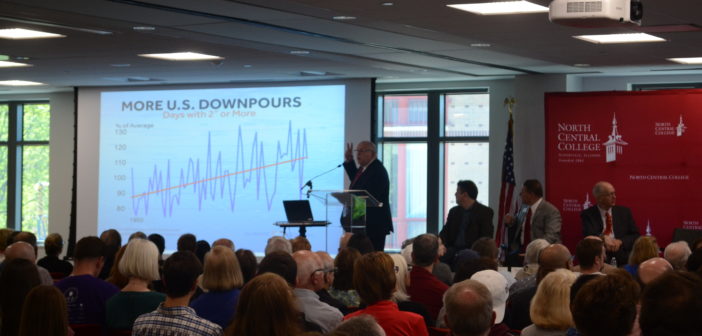Just six weeks after it opened, North Central College’s new Science Center hosted a panel discussion regarding climate change on a personal and political level. On May 6, 2017, six speakers of various backgrounds took the time to discuss and debate what they often referred to as the most pressing issue in our lives today.
Leading the discussion were two familiar local faces: Bill Foster, a member of the 11th District of the Illinois House of Representatives, and Tom Skilling, WGN’s veteran meteorologist who has worked with Chicago’s superstation since 1978.
Panelists also included Paul Bloom, a physics professor at North Central, in addition to Mary Gade, the president of Gade Environmental Group, LLC, and Doug Sisterson, a meteorologist for Argonne National Labs.
The panel, which devoted a considerable amount of time to Skilling analyzing varying extremes of recent weather patterns, comes just one week after several suburbs and inner-city areas of Chicago experienced flooding after as much as 5 inches of rainfall came within a two-day period.
“This flooding situation is the 11th one in Illinois in a year and a half,” Skilling said in a personal interview. “Meteorologists go through a great effort to attribute weather events to climate changes, but the rainfall is definitely a visible sign.”
Foster, who is currently the only scientist in Congress, spoke about research budgets serving as the groundwork for climate change legislation.
“The single most important thing (regarding climate change legislation) are research budgets,” said Foster shortly before the panel took place. “Passing those leads to discovering energy resources, which leads to things like cars getting better mileage.”
Gade, who ran the Illinois Environmental Protection Agency (EPA) for 13 years on top of working under former president George W. Bush, has used her connections and skills to establish Gade Environmental Group, LLC. The group deals in environmental law and works on sustainability and energy, not only in the United States but in several international markets, including China.
“The oil and gas industry has been increasing their receptivity (to climate change),” Gade states, serving as the biggest barriers to passing meaningful legislation to things like curbing carbon emissions. “President Donald Trump has also slowed progress, undoing Barack Obama’s climate change initiatives so quickly,” she adds.
In his first 100 days, President Trump has made 23 rollbacks to environmental regulations, including an executive order to review the Clean Power Plan to determine its effectiveness, in addition to holding an upcoming vote to repeal regulation which would relax methane restrictions and allow factories to release more chemicals into the atmosphere.
“This administration has a fundamental, and perhaps willful, ignorance on the matter of human-caused climate change,” Foster said early on in the panel. “It’s our responsibility on educating the next generation on the truth about climate change.”
Doug Sisterson, who co-authored the book “How to Change Minds About Our Changing Climate” with Seth B. Darling, also spoke about “the average condition,” something that has largely determined the progression and effects of climate change. He said it’s also why many people have such a hard time coming to terms with the large issue.
“Some will experience warmer weather, some will experience colder weather, all depending on where you live,” Sisterson said. His comments came shortly after Skilling ran a slideshow of photographs taken from small, rural towns in Will County, the places hit the heaviest by the past week’s flooding.
Despite the panel, including a post-Q&A session, lasting two hours, all the respective speakers implored this was not an issue that could be summarized, or even solved, in a short amount of time. They all stressed the need for citizens to stay informed and to be vigilant in contacting politicians who are working against the demands of the environment.
“I didn’t come to my decision quickly or easily,” Skilling admitted to the packed crowd. “But climate change is the issue of our time — it is not a hoax, it is real.” He ended by saying, “there is absolutely no reason to be ill-informed” in a time of incredible access to information.
Arguably more succinct was Sisterson when asked at the conclusion of the panel about how to respond shortly and effectively to someone who doesn’t believe climate change exists or is even an urgent matter.
“Mother Nature doesn’t care what you believe,” Sisterson said.

